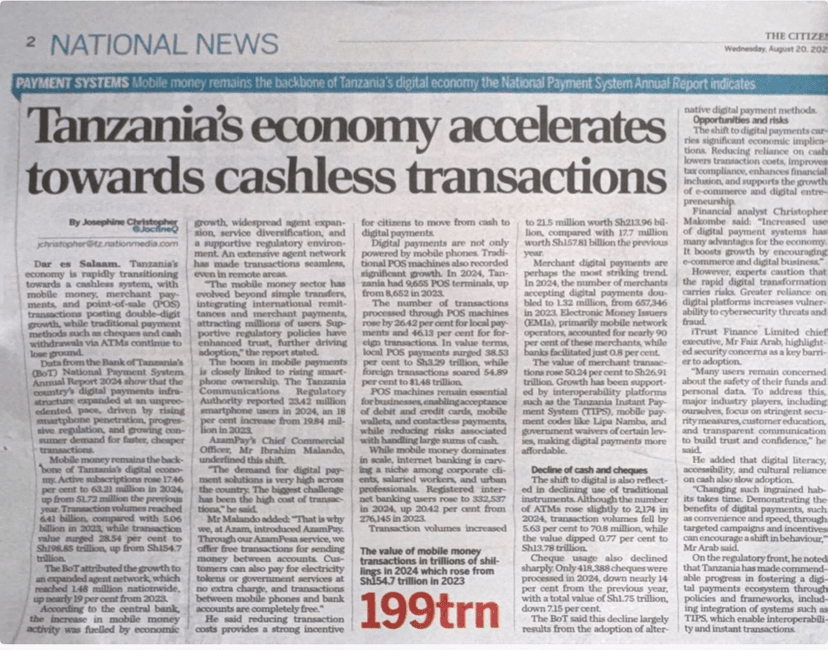And Josephine Christopher
Dar es Salaam – The Tanzanian economy is increasingly shifting towards a cashless system, with mobile money services, merchant payments, and point-of-sale (POS) machines showing high growth rates. At the same time, electronic channels such as ATMs continue to decline in usage.
Data from the Bank of Tanzania (BoT) through the Annual Payment System Report shows that digital payments via mobile money increased by 22.7 percent in 2024, from TZS 162.6 trillion in 2023 to TZS 199 trillion. This growth has resulted from high customer demand for faster, cheaper, and more convenient services.
“Mobile money services are the backbone of Tanzania's digital economy, contributing nearly 72.6 percent of total digital payments in 2024. The value increased from TZS 172 trillion in 2023 to TZS 199 trillion in 2024, while card payments rose to TZS 19.6 trillion from TZS 15.47 trillion in 2023,” said BoT.
Telecom companies registered 148 million accounts nationwide, an increase of 10.7 percent from 2023.
According to the Central Bank, the expansion of mobile money activities has been driven by economic growth, an increase in agents, service diversification, and an improved legal environment. A large network of agents has made transactions easier and safer.
“The mobile money sector has expanded beyond traditional transfers, including international remittances and merchant payments, supported by a robust regulatory framework. These services have increased financial inclusion,” the statement said.
The growth of mobile payment has also been driven by innovations from fintech companies. The Tanzania Communications Regulatory Authority (TCRA) reported that the number of mobile internet users rose from 18.4 million in 2023 to 22.1 million in 2024.
AzamPay's Chief Business Officer, Mr. Michael Malando, said:
“The demand for digital payments is very high due to its convenience. Trust in mobile money services has increased the usage of transfers and merchant payments.”
For example, AzamPay has launched AzamWey, a new system for transferring money between accounts. Other services such as electronic receipts and government service payments have also started to gain traction.
The BoT report noted that the low cost of transactions incentivizes citizens to transition more to digital payments. These payments are not only conducted through mobile phones, but the number of POS machines has also been increasing.
In 2024, Tanzania registered 96,585 POS machines, up from 86,652 in 2023. The number of transactions increased by 42 percent to 21.5 million worth TZS 13.96 trillion, compared to 17.7 million worth TZS 11.8 trillion the previous year.
Digital payments for merchants also showed significant growth. The number of merchants accepting digital payments rose to 1.32 million from 657,346 in 2023. Electronic Financial Institutions, including mobile networks, accounted for nearly 90 percent of these merchants.
The value of merchant transactions increased by 52.4 percent to TZS 26.9 trillion in 2024, up from TZS 17.6 trillion in 2023. This growth has been enabled by collaborative systems such as the Tanzania Instant Payment System (TIPS), mobile payment integration platforms, and increased digital awareness among citizens.
Decline in cash and check usage
Cash usage has declined as citizens embrace alternative methods. Although the number of ATMs slightly increased to 2,248 in 2024, the amount of cash withdrawn fell by 5.6 percent to TZS 70.8 trillion from TZS 74.9 trillion in 2023.
The use of checks has also decreased, falling to TZS 8.9 trillion in 2024, a drop of 14 percent from TZS 10.4 trillion in 2023. The number of processed checks also declined to 7.1 million from 7.7 million the previous year.
BoT stated that this decline has been further driven by the expansion of alternative digital payment methods.
Opportunities and challenges
The shift towards digital payment has significant economic implications. The decrease in reliance on cash reduces transaction costs, improves tax collection, enhances financial inclusion, and stimulates online business growth and digital entrepreneurship.
Financial analyst Mr. Christopher Nimonela said:
“The use of digital payment systems not only enhances financial inclusion but also strengthens government revenue through tax payments.”
The report also emphasized the importance of protecting digital systems from fraud risks and cyberattacks.
The Chief Executive Officer of iTrust Finance Limited, Mr. Faiz Arab, said:
“Many users still have concerns about personal data security, theft, and misuse of their information. To address this, innovation should focus on security, customer protection, and user education.”
He added that digital awareness, accessibility, and a culture of usage are important criteria for enhancing collaboration.
The Tanzanian government has been taking steps to expand digital infrastructure. BoT stated that linking systems through TIPS will enhance system interoperability and facilitate real-time transactions.


